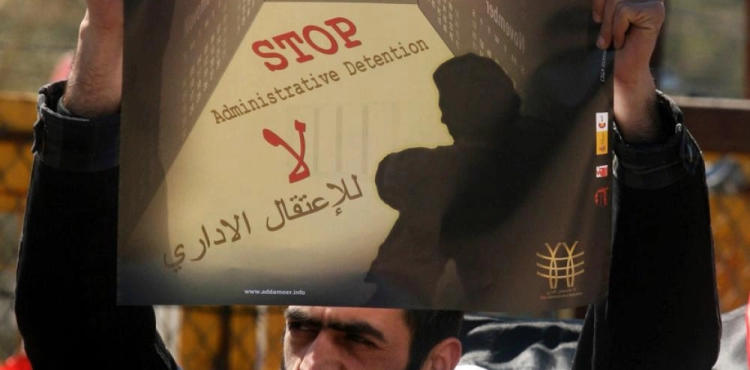The Palestine Center for Prisoner Studies monitored (554) administrative decisions during the first five months of this year.
In a statement, the Center noted that, since the beginning of this year, the occupation authorities have escalated the issuance of administrative orders against Palestinian prisoners, especially in the last two months.
PCHR said that the occupation has recently resorted to issuing administrative detention orders on a large and noticeable scale as a policy of collective punishment of the Palestinians for their solidarity with the residents of Jerusalem who are threatened with displacement, as well as in protest against the barbaric aggression that the Gaza Strip was subjected to at the end of Ramadan, as it is an arbitrary detention that does not require indictments or procedures. Judicial.
The director of the center, Riad Al-Ashqar, said that the administrative orders focused in particular on national and Islamic leaders, activists, opinion leaders, journalists, and those who the occupation claims to be instigators for fear of inflaming the Palestinian street and inciting it to confront the occupation’s aggressive policies and incriminating it against the Palestinians.
Also, last April, the occupation issued dozens of administrative detention orders against potential candidates for the Legislative Council elections, which were scheduled to take place this month and were canceled, especially from members of the Jerusalem Bloc. Our Date.
Al-Ashqar explained that the administrative decisions issued since the beginning of this year amounted to (554) decisions, including (324) decisions to renew administrative detention for additional periods extending between two to 6 months, and reached (5) times for some prisoners, while (230) decisions Administratively, it was issued against my captives for the first time, most of whom were freed prisoners who were re-arrested.
Al-Ashqar revealed that the number of administrative prisoners recently reached more than (500), most of whom are liberated prisoners who spent different periods in prisons and were re-arrested again, and most of them were renewed for other periods, including (8) members of the Legislative Council, and (two female prisoners). And (3) minors.
And he considered that the detention policy is a tool of collective punishment against the Palestinian people, as the occupation uses it extensively without taking into account the caveats laid down by international law that limited its use, except in a narrow framework, which is considered a disregard for all customs and laws and a disregard for international institutions.
Al-Ashqar said, “Despite international warnings about the occupation’s misuse of the administrative detention law and its failure to adhere to international standards in limiting the application of this type of unjust detention, which classified detainees as prisoners of conscience, the occupation did not stop issuing administrative detention orders against Palestinian prisoners.”
Al-Ashqar considered administrative detention as a criminal policy aimed at draining the lives of Palestinians behind bars without legal basis, except for the security considerations on which the intelligence service officers, who manage this file, and dictate instructions to the moot courts to issue administrative orders based on secret files that no one is allowed to view.
He called on the international community and its legal institutions, which set the prohibitions and conditions when using this type of detention, to intervene to stop the draining of the Palestinians´ reconstruction without being charged, and to put pressure on the occupation to stop the arbitrary administrative detention.












